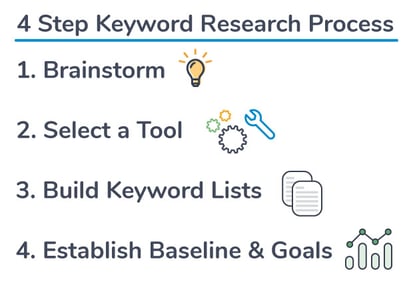Blitz News Digest
Stay updated with the latest trends and insights.
Keyword Research: Your Secret Weapon for Online Success
Unlock the secrets of keyword research and skyrocket your online success with expert tips and strategies! Start thriving today!
Understanding the Basics of Keyword Research: A Beginner's Guide
Keyword research is a fundamental aspect of search engine optimization (SEO) that every beginner should understand. It involves identifying the terms and phrases that potential customers are using to search for information related to your business or niche. By performing effective keyword research, you can optimize your content to align with these search queries, thus increasing your chances of ranking higher in search engine results. A great resource to get started with keyword research is Moz's Beginner's Guide to SEO.
To start your keyword research, you can use various tools, such as Google Keyword Planner, Ahrefs, or SEMrush. Begin by brainstorming a list of topics that relate to your blog or website, and then use these tools to discover relevant keywords. Look for keywords with a balance of search volume and competition; ideally, you want to target keywords that have a decent search volume but are not overly competitive. For in-depth tips on finding the right keywords, visit Ahrefs Blog on Keyword Research.

How to Choose the Right Keywords for Your Content Strategy
Choosing the right keywords for your content strategy is crucial for maximizing your online visibility and attracting the right audience. Start by conducting thorough research using tools like Moz Keyword Explorer or Ahrefs Keyword Generator. These platforms can help you identify high-volume, low-competition keywords relevant to your niche. Make sure to consider user intent when selecting keywords; this means understanding what your audience is searching for and aligning your content accordingly. Additionally, don’t forget to analyze competitors’ keywords to uncover opportunities that you can leverage.
Once you have a list of potential keywords, it’s important to prioritize them based on factors like search volume and relevance. You can categorize your keywords into three main types: short-tail keywords, which are broad and competitive; long-tail keywords, which are more specific and often less competitive; and local keywords, which target geo-specific searches. Incorporating a mix of these keywords into your content strategy will enhance your chances of ranking higher on search engine results pages. For more tips on keyword integration, check out this helpful resource from Backlinko.
The Impact of Long-Tail Keywords on SEO Success
Long-tail keywords play a crucial role in enhancing SEO success by targeting specific user intent. Unlike general keywords, long-tail keywords are typically longer phrases that cater to niche audiences. For instance, instead of targeting a broad term like 'shoes', a long-tail keyword would be 'best running shoes for flat feet'. This specificity not only increases the chances of attracting relevant traffic but also reduces competition, making it easier for smaller websites to rank higher on search engines.
Moreover, the use of long-tail keywords can significantly boost conversion rates. Visitors who use these specific search terms are often further along in the buying cycle, indicating a strong intent to purchase. By optimizing for long-tail keywords, businesses increase their visibility on search engines while ensuring that their content resonates with a targeted audience. In summary, leveraging the power of long-tail keywords can lead to improved SEO rankings and higher-quality leads, ultimately resulting in greater success for online businesses.